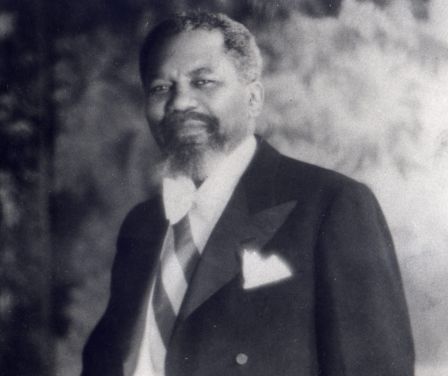French teacher and politician Gratien Candace was born on December 18, 1873 in Guadeloupe, a French overseas territory. His father Edouard was born in Guadeloupe as well, only two years before slavery was formally abolished in France, in 1848. Candace is the first French black politician to hold office as a deputy in the French National Assembly. However, he remains relatively unknown to the public. He was married to Jeanne Marie Binet.
At aged 18, Candace became a teacher in Guadeloupe. He traveled to France for the first time in 1895 at the age of 22 after he received a scholarship from the Département de Guadeloupe and settled in Toulouse where he served as a student-teacher at the École Normale Supérieure. Upon completion of his degree, Candace returned to Guadeloupe and was nominated deputy teacher in Basse-Terre. In July 1900, Candace came back to Toulouse where he took up classes in agriculture and philosophy classes at the University of Toulouse and earned a bachelor degree in sciences. While in Toulouse, he attended speeches given by Jean Jaurès, a famous Socialist leader, defender of workers’ rights and antimilitarist, who would greatly influence him.
In 1902, Candace was sent to Tunisia on an agricultural mission by Gaston Doumergue, who was then the Secretary for the Colonies. Right after he completed a similar mission in Trinidad, Candace returned to mainland France in 1904 and settled in Pau where he was a teacher for commercial and technical affairs at École primaire supérieure de Pau. In 1906, he began his political career as staff member to René Viviani, Secretary of Labor in the cabinet of Georges Clémenceau.
Ten years later in 1912 Candace was elected deputy to the French National Assembly representing Guadeloupe’s first district. He became a member of the Socialist Republican group in Parliament which promoted political rights for indigenous residents of the colonies as one of its main goals. While deputy, Candace contributed to extending the military draft to France’s Old Colonies (Guadeloupe, Martinique, Guyane, Réunion). He is also designated director of La Justice, a newspaper founded by now former head of state Georges Clémenceau.
Candace was re-elected in 1919. As a deputy, he participated in the meetings leading to the Treaty of Versailles. He also introduced legislation reaffirming the principle of equality for all men, regardless of their ethnicity or race. In October 1921, he became president of the Département of Guadeloupe. That same year, Candace participated in the Congrès de la Race noire alongside American author and civil rights activist W.E.B. DuBois. Afterwards they both corresponded on a regular basis.
Candace was constantly re-elected from 1912 until just prior to World War II (1914, 1919, 1924, 1928, 1932, 1936—despite charges of electoral fraud). In 1932, he was nominated deputy Secretary of State for the Colonies. During his numerous terms, he also lobbied for women’s right to vote, putting this campaign on equal footing with the abolition of slavery of 1848. In 1936, he was promoted to vice-president of the Chamber of Deputies.
After France was defeated by Nazi Germany in 1940, he voted to support Philippe Pétain’s Vichy regime. Far from agreeing with Pétain’s anti-Semitic or racist views, Candace nonetheless held several positions in Pétain’s government. Simultaneously he embodied legal resistance to the new regime, remaining vice-president of the National Assembly. France’s 1944 liberation ended Candace’s political career: on the one hand, he was considered a collaborationist by the 1944 liberation forces under General Charles DeGaulle; on the other, he was viewed as an enemy of the regime by Pétain’s supporters. In 1945 he was declared ineligible to hold office. Gratien Candace died in 1953 in Nogent le Rei, France. He was 80.

